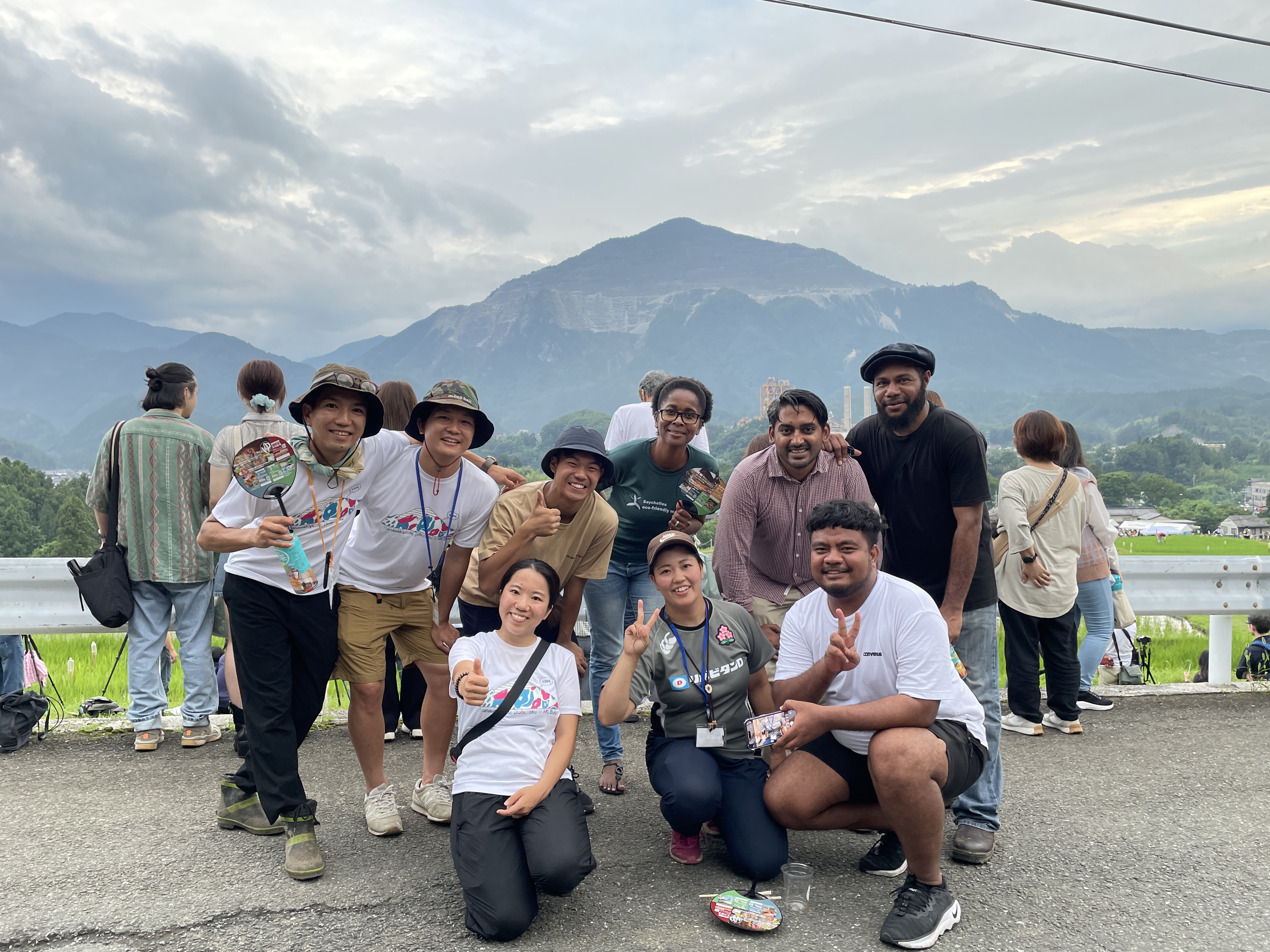
The JICA team with Mt. Buko, symbol of Yokoze, Saitama
From 5th to 7th July 2024, four JICA scholars (Course: SDGs Global Leader) participated in the internship in Yokoze, Saitama.
What is the internship program for JICA scholars?
JICA offers study in Japan programs for young government officials, who will be the future leaders of developing countries, to study at graduate schools in Japan to deepen their expertise and make use of it for the future of their home countries. Some programs provide internships during or after graduate school as an opportunity to gain practical knowledge. This was the first time to conduct a local government internship, and Yokoze town in Saitama prefecture accepted .
Yokoze is a unique municipality that advocates “the town of open to innovation,” and has been cooperating with JICA in various ways. Since this year, they have accepted “the Glocal Program” in which JICA Overseas Cooperation Volunteers tackle regional issues in Japan before being dispatched.
The participants are four JICA scholars from Pacific and Indian Ocean island countries (Papua New Guinea, Kiribati, Mauritius, and Seychelles), who are responsible for local community development. The three days in Yokoze began with three Glocal Program trainees who have been living in Yokoze for about two and a half months and working as town residents.
How does Yokoze appear in their eyes?
Together with three Glocal Program trainees, we formed a team and prepared for the town festival.
Learn about the town development of Yokoze, Saitama Prefecture
The first day began at “Area 898,” a community space that utilizes the former site of an agricultural cooperative's direct sales office. In this open space, Mr. Masanobu Tabata, a town hall division chief, spoke to us about Yokoze town's efforts.
Yokoze is a small town with a population of approximately 7,600 and a rich natural environment despite its proximity to the city center. The main industry is lime produced from Mt. Buko, and the town is famous for its more than 365 festivals held annually. The town aims to be “the town of open to innovation” and “the most supportive town for innovators in Japan” and is developing “Yokorabo,” a platform for public-private partnership projects, taking advantage of the speed of decision-making that only a small town can offer. He also introduced unique approaches, such as the “Doburoku Special Zone Project” to develop new specialty products and the “Planting Seeds of Curiosity Project” for students who are often absent from school.
Mr. Tabata, who was born and raised in Yokose, is a key person leading the Yokoze’s community development. Inspired by Mr. Tabata's energetic spirit, the participants actively asked him questions. One participant commented, “I was particularly interested in the regional development involving private sector and the support for children who cannot go to school.” Another participant said, “It was worth participating in the internship just to hear Mr. Tabata's presentation. It was refreshing to hear about the struggles involved in community building and private-sector partnerships.” Seeing the passionate town hall official must have been an inspiration to the participants.

Listening intently to Mr. Tabata at the community space “Area 898”
Experiencing Nature in Yokoze Town with Glocal Trainees
On the morning of the second day, we visited a tourist farm in Yokoze Town. Yokoze is a mountainous town with limited suitable areas for agriculture. The tourism farms, which cultivate high value-added crops and offer hands-on experience, have become one of the industries that support the town.
Komatsuzawa Leisure Farm is the best sightseeing farm in the Kanto region, where visitors can enjoy harvesting seasonal crops such as shiitake mushrooms, grapes, and strawberries, as well as lava rock BBQ, trout fishing, and other family activities. The group enjoyed picking shiitake mushrooms and catching trout, and then deepened their friendship over a BBQ full of vegetables and meat.
This farm was an ordinary farmhouse until a generation ago. However, by developing it into a tourism farm, they were able to hire as many as 50 employees, whereas before they could only feed one family. They planted seasonal fruits and vegetables and devised ways to provide year-round leisure activities. The participants seemed to be interested in the idea.

First time picking shiitake mushrooms.
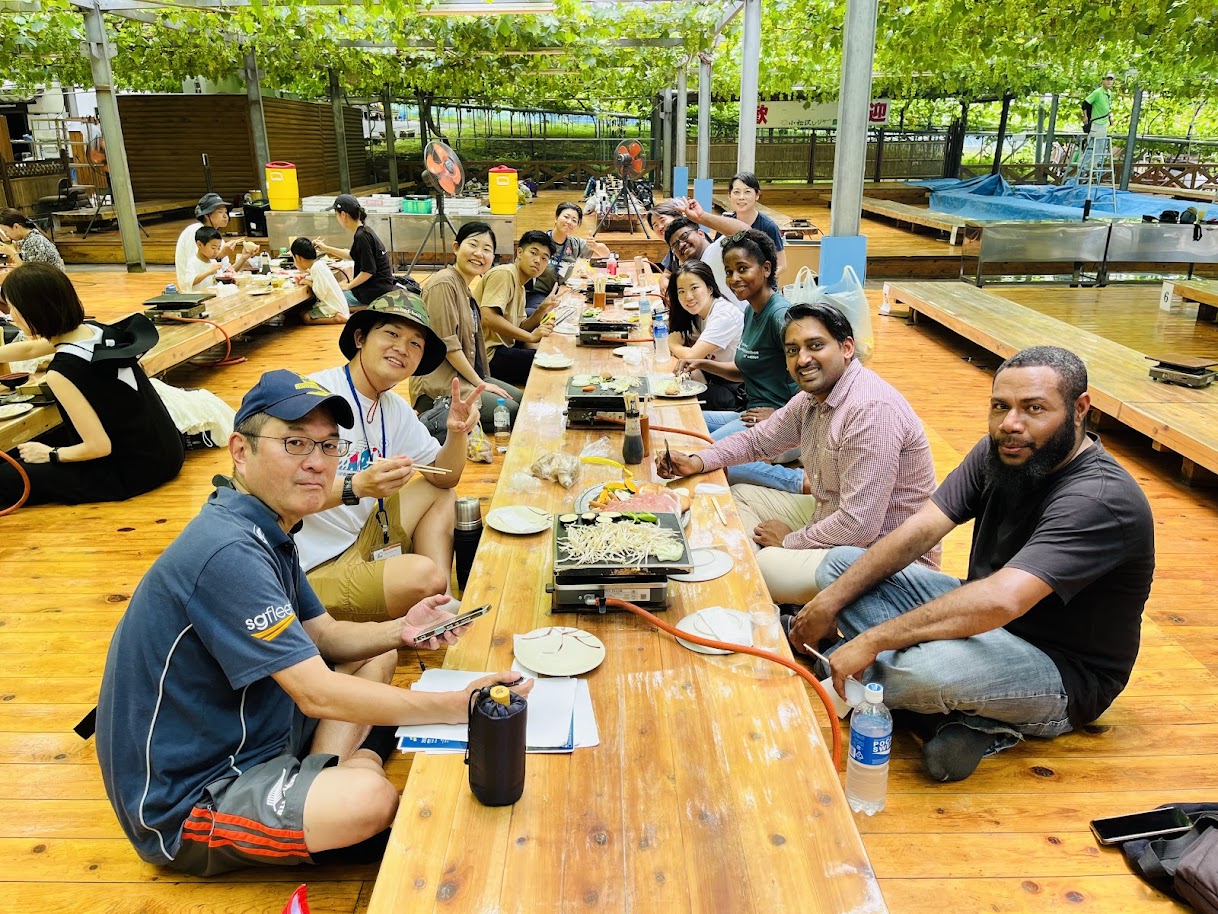
We also enjoyed lava BBQ.
Finally, the Terasaka Terraced Rice Paddy Firefly Bonfire Festival!!
In the afternoon, the main event of the day, the Terasaka Terraced Rice Paddy Firefly Bonfire Festival, is finally started. Under the direction of local residents, approximately 600 bonfires are set up. JICA scholars teamed up with Glocal trainees to set up bonfire stands along the footpaths between rice paddies.
The sky was clear in the morning, but by midday, the clouds had turned threatening, and heavy rain fell during preparations. JICA scholars and Glocal trainees somehow managed to complete their preparations with kappas and umbrellas. In the evening, when it was getting dark, we turned on the lights and the event should finally begin. Please let the rain stop, we prayed.
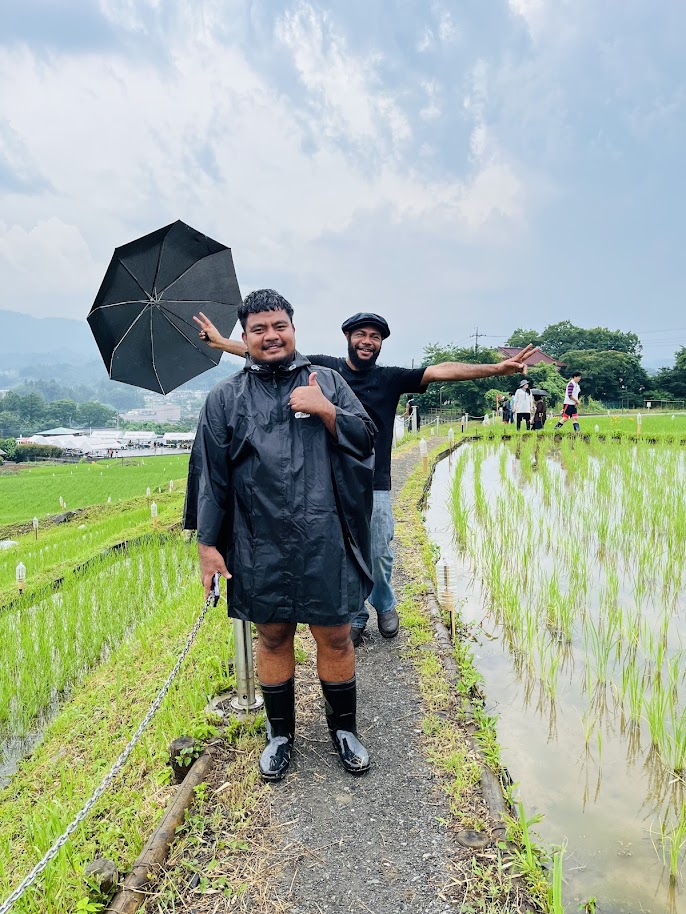
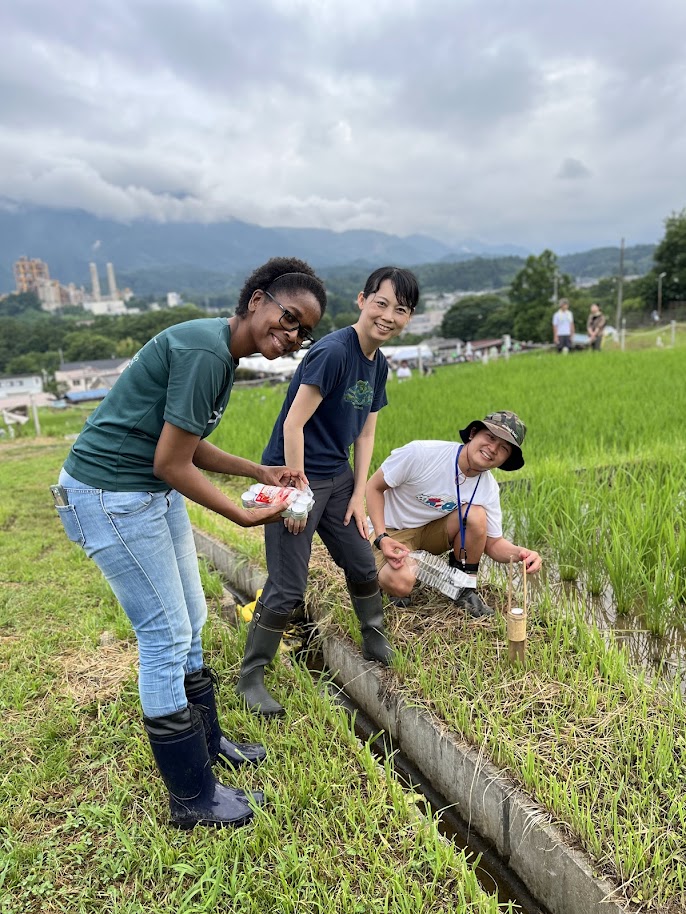
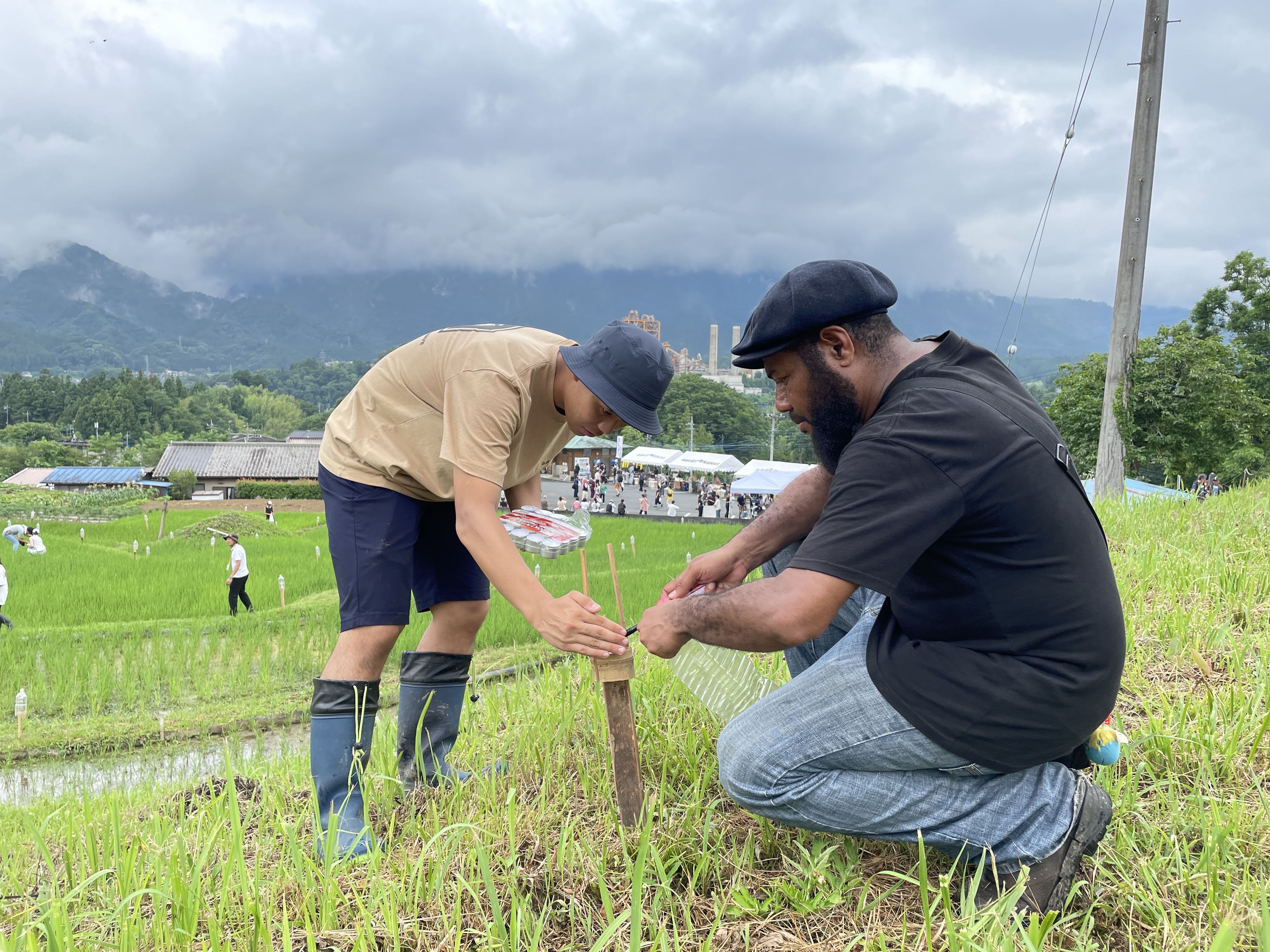
Bonfire stand made from bamboo waste and plastic bottles
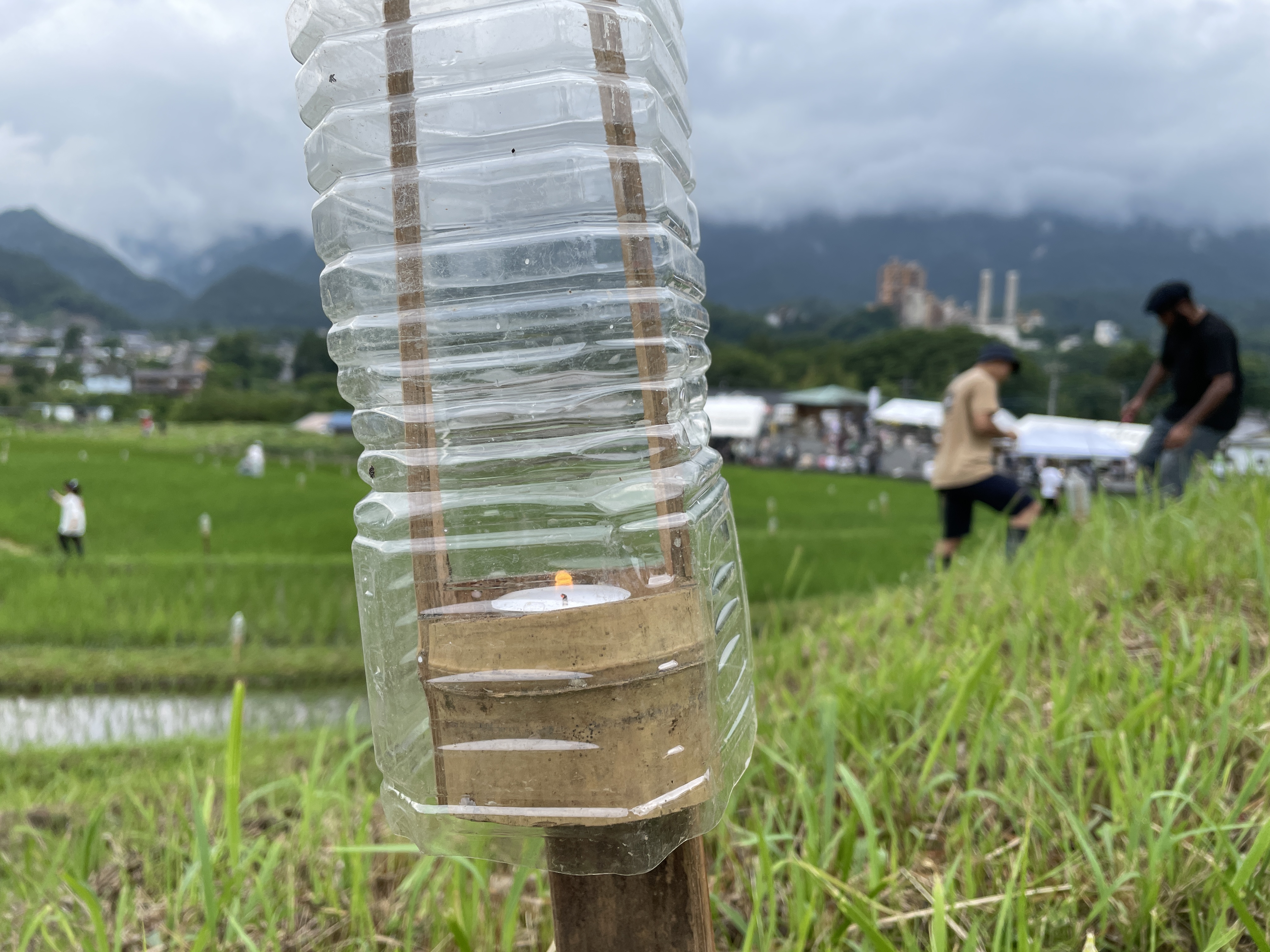
By the time the bonfire was lighted, the rain had stopped and the clouds that had completely enveloped Mt. Buko disappeared. As the sun went down, warm light particles spread over the terraced rice paddies.
Soon many people from inside and outside the town gathered, and the stalls of the locals became lively. A concert was held in the middle of the rice paddies, and people walking along the paths walked as they pleased, stopping to take pictures. In the fantastic scenery, we felt as if all the hard work in the heat and rain during the day had paid off.
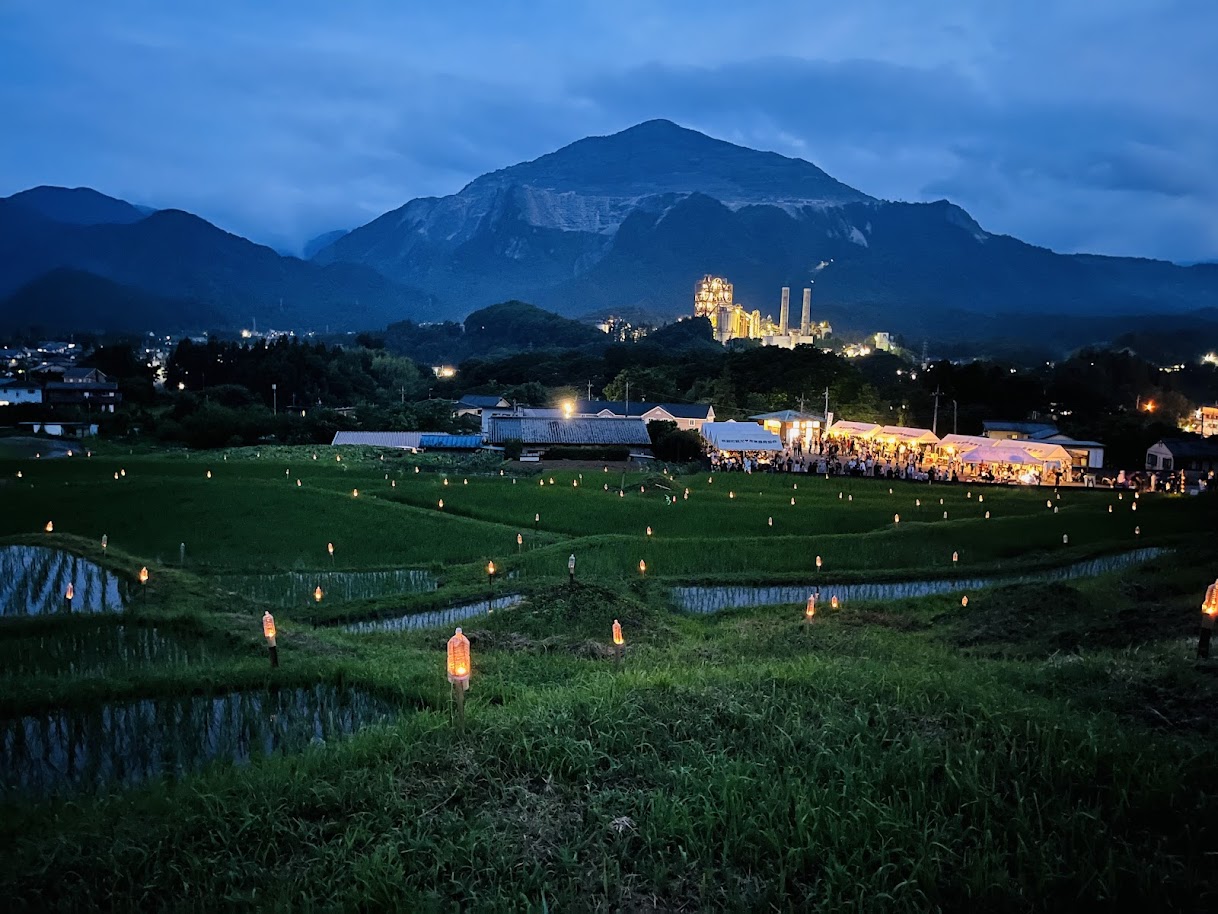
Scenery of firefly bonfire in Terasaka terraced rice field
Looking back on the three days
On the last day, we walked around Chichibu City, next to Yokoze Town. I asked four participants what they thought of these three days.
Ms. Loureen from Seychelles, a student at Naruto University of Education in Tokushima Prefecture, said, “I was able to learn about the various efforts being made in rural areas of Japan, including Tokushima, where I currently live, and now Yokoze Town.” She also said that because Seychelles is also a small country, she was able to get some hints on how to consider the strengths and innovations unique to a small country.
Mr. Walter from Papua New Guinea, who is currently studying at Toyo University, was very impressed with the private-sector collaboration efforts in Yokoze town. “Private partnerships are an important topic in Papua New Guinea as well. Yokose town gave me new ideas such as start-up support and attracting pilot projects.”
Mr. Nirvaan from Mauritius, who is currently a student at Hiroshima University, suggested that he would like the opportunity to be able to propose ideas to the town. In Mauritius, he is working for the Tourism Agency and came up with many ideas. We will have a debriefing session for Yokoze Town later in the day and look forward to hearing his suggestions.
Mr. Kimaere from Kiribati, who is studying at Kwansei Gakuin University, seemed to spend these three days in a relaxed atmosphere. One of the Glocal trainees will be sent to Kiribati soon. We hope that this was a valuable exchange opportunity for both participants.
This was our first attempt at an internship at a local government, and we will continue to plan future program so that both JICA scholars and the local government can gain more from the program.




scroll